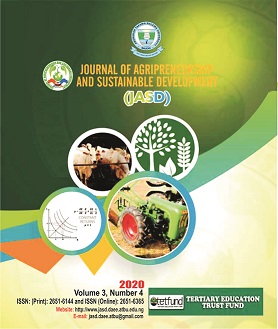EFFECTS OF NIGER STATE RICE INVESTMENT CONSORTIUM PROJECT ON COMMERCIALIZATION LEVELS OF SMALLHOLDER FARMERS IN NIGER STATE, NIGERIA
DOI:
https://doi.org/10.59331/jasd.v3i4.173Keywords:
Commercialization, Consortium, Niger State, Rice, SmallholderAbstract
The study assessed the effects of Niger State Rice Investment Consortium (NSRIC) project on commercialization levels of smallholder rice farmers in Niger State, Nigeria. A total sample size of 234; made up of 117 participants and 117 non-participants drawn from 12 localities in three (3) Local Government Areas (LGAs) were selected through multi-stage sampling technique. Data were collected from primary source using well-structured questionnaire administered by the researcher and with the assistance of well-trained enumerators from the Niger State Bureau of Statistics (NSBS). Data were analyzed using descriptive statistics, household commercialization index (HCI), Tobit regression model and Henry Garrett technique. The result showed that the respondents were in their productive age with mean age of 39 and 44 years of participants and non-participants, respectively; and also, the participants (80.34%) and non-participants (81.22%) were married. The result further revealed the mean farm size of 2.0ha and 1.84ha for participants and non-participants, respectively. The result of HCI revealed the mean household commercialization indices of 67.25%, 31.57% and 49.41% for participant, non-participant and pooled sample, respectively. The Tobic regression analysis disclosed that the coefficients of household size and extension contact were negative but however, significantly influenced smallholder level of rice commercialization. The coefficient of gender, farm size, quantity of rice produced, NSRIC project participant, access to market information, unit price of product, irrigation, access to tractorization and training were positive and significantly influenced smallholder rice commercialization. The costs and returns analysis revealed that the farmers earned N123,684.08 and N46,872.14 for participants and non-participants, respectively. It was recommended that governments at all levels should develop appropriate policies and strategies to promote the commercialization of smallholder Agriculture in the State and farmers themselves should form and maintain effective farmer groups to take advantage of better market prices for their products through their collective bargaining power.
Downloads

Downloads
Published
How to Cite
Issue
Section
License
Copyright (c) 2022 Journal of Agripreneurship and Sustainable Development

This work is licensed under a Creative Commons Attribution 4.0 International License.






